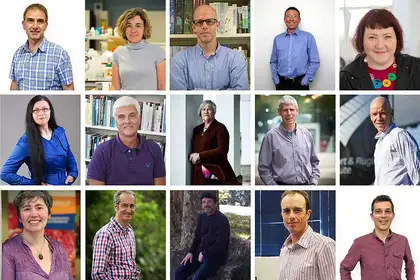
The latest promotion round has seen 15 Massey University staff promoted to professor and 19 to associate professor.
Massey's newest professors
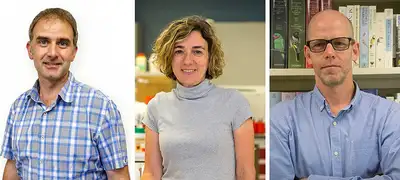
Professors Anderson, Camps Arberstain and Dale.
Professor Chris Anderson – Institute of Agriculture and Environment
Professor Anderson is a soil scientist with expertise in environmental geochemistry. His research focuses on the use of plants to extract, degrade or immobilise contaminants in soil, and he applies this to artisanal gold mining, phytomining, phytoremediation, and to managing contamination in agricultural land. He holds several adjunct professorships and works extensively in other countries. Part of his commitment to developing other countries is evident in his work on the East Indonesia Innovative Farm Systems and Capability in Agribusiness Activity, where with farmers, government and Massey educators are building a more sustainable and successful agriculture sector. In September, Professor Anderson was presented with the Guizhou Provincial Government Science and Technology Collaboration Award for 2016 in Guiyang, China.
Professor Marta Camps Arbestain – Institute of Agriculture and Environment
Professor Camps Arbestain is the co-director of the New Zealand Biochar Research Centre. Her research interests include soil biogeochemistry, soil organic matter and soil processes as they relate to pedogenesis and climate change. She is an active mentor, supervising two PhD students and co-supervising another three, with two more about to start. Previous to working at Massey University, she was a senior researcher at NEIKER Institute for Agricultural Research and Development and lecturer at the Universidade de Santiago de Compostela, both in Spain. She has been a member of the Intergovernmental Technical Panel on Soils and a member and the chair of the Board of Directors of the International Biochar Initiative.
Professor James Dale – Institute of Natural and Mathematical Sciences
Leading the Evolutionary Ecology Group, Professor Dale‘s research addresses fundamental questions about evolution by examining how species life history traits and global patterns of biodiversity can inform us about evolutionary processes. His current research, a 2015 Marsden project, “Evolutionary drivers of ornamental coloration in male and female birds”, strives to understand why, in a great many species both sexes display extravagant ornamental colouration.

Professors Fuller, Galbraith and Glover.
Professor Ian Fuller - Institute of Agriculture and Environment
Co-director of innovative river solutions Professor Fuller is an specialist in applying theoretical knowledge to provide solutions to issues of river and catchment management. He has considerable expertise in river channel dynamics, and interaction with river habitat; flood histories and catchment response to environmental change; and slope-channel coupling and catchment connectivity. Awarded a Vice-Chancellor's Teaching Excellence Award in 2015, he has a strong interest in the pedagogy of geography teaching and is on the editorial board for the Journal of Geography in Higher Education. Professor Fuller comments on a range of important environmental issues and has written several newspaper commentaires and given a number of public lectures and more than 80 peer-reviewed articles.
Professor Heather Galbraith - Whiti o Rehua School of Art
Professor Galbraith is a curator and writer who works in the fields of modern and contemporary New Zealand and international art. In 2009 Professor Galbraith was co-curator for Francis Upritchard: Save Yourself, part of New Zealand’s official Venice Biennale presentation. She continued involvement with the New Zealand pavilions in 2013 as deputy commissioner for Bill Culbert: Front Door Out Back, and as commissioner for New Zealand's presentation at the 2015 Venice Biennale, Simon Denny: Secret Power. Professor Galbraith has held senior curator roles at New Zealand museums Museum of New Zealand Te Papa Tongarewa and City Gallery Wellington, and was the inaugural director/curator of AUT University’s St Paul St Gallery. She has been a jury member for the Walters Prize and judge for the National Drawing Award, Waikato Art Award and Headland Sculpture on the Gulf. In 2013 she was judge for the inaugural Parkin Drawing Prize. This year she led a symposium with City Gallery to coincide with the staging of the Cindy Sherman photographic exhibition and was managing curator for the second of three annual exhibitions for SCAPE Public Art in Christchurch.
Professor Marewa Glover - School of Health Sciences
Professor Glover’s research addresses major public health threats for Māori: smoking, obesity and insufficient physical activity. She has worked in tobacco control for the past 23 years across policy, health promotion and advocacy and research. She is an internationally recognised authority on electronic cigarettes and their use. Professor Glover’s other health priorities include how to support Māori women to reinstitute breastfeeding, Māori attitudes towards infertility and interpersonal violence. She specialises in kaupapa Māori health research methodology and inductive qualitative analysis methods.
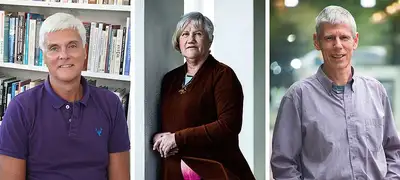
Professors Henrickson, Hunter and Jones.
Professor Mark Henrickson – School of Social Work
Professor Henrickson is well known internationally for his research in sexual minorities, and in HIV particularly in diasporic Black African communities. He co-authored Vulnerability and Marginality in Human Services with Professor Christa Fouché from the University of Auckland, drawing on international research to explore vulnerability and marginality as they intersect with notions of power and privilege. Professor Henrickson also served as editor in chief on Getting to Zero: Global Social Work Responds to HIV, providing an unprecedented international snapshot of social work responses to HIV. He is a staunch advocate for the rights of sexual and gender minorities, and was the first New Zealand social worker from New Zealand to deliver the prestigious Eileen Younghusband Memorial Lecture at the 2016 World Social Work Conference in Korea. Professor Henrickson and his team were recently awarded $845,000 from the Royal Society of New Zealand's annual Marsden Fund to study sexuality and ethics in aged care.
Professor Bobbie (Roberta) Hunter - Institute of Education
Professor Hunter has sparked a revolution in mathematics achievement among Pasifika and Māori school pupils and other minoritised learners using a culturally-tailored, inquiry-based approach she developed for her PhD at Massey. Her work has attracted worldwide attention and made a difference in the lives of South Auckland school children and many others in low decile schools around New Zealand. She has been widely recognised in mathematics education globally, including being the second New Zealand recipient of the prestigious Mathematics Education Research Group of Australasia’s Beth Southwell Practical Implications Award in 2008 for her paper titled Facilitating communities of mathematical inquiry.
Professor Geoff Jones – Institute of Fundamental Sciences
Professor Jones is a statistician who during his 20 years of service to Massey has used his considerable expertise to help students, staff, United Nations agencies working in third-world countries and many others. His research interests are mainly in biostatistics, particularly in the use of Bayesian methods in epidemiology, where he has made important theoretical contributions on diagnostic testing and model identifiability. The breadth and quality of his research was recognised with the premier New Zealand Statistical Association research award, the Littlejohn Award, last year.
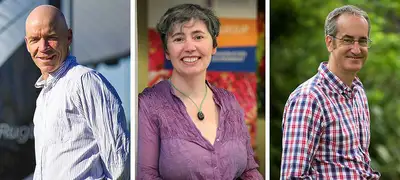
Professors Martin, Morgan-Richards and Munday.
Professor Andy Martin - School of Sport, Exercise and Nutrition
Professor Martin’s applied learning research is related to sport management education, coach and physical education and outdoor experiential education. His research projects have involved Outward Bound International, and he was co-author of Legends in Black, a best-selling book on why the All Blacks win. He has supervised more than 500 sport management and coaching practicum students since 2000, and developed a number of teaching resources for the How to Make the Most of Work Integrated Learning series. Professor Martin has been involved in triathlons as a participant and event manager in New Zealand for the past 25 years, and helped create the I Tri’d the Tri Series in Manawatū in 2004, an event that this year saw 660 children participating each week.
Professor Mary Morgan-Richards – Institute of Agriculture and Environment
Massey’s ecology group and Phoenix Lab would not be the same without the work of Professor Morgan-Richards. Her enthusiasm for working with small New Zealand animals, such as weta, stick insects and snails, has led her to address big problems in evolutionary biology. She is an expert in hybridisation of genetically distinct populations, the process of speciation and the evolution of sexual reproduction. Her graduate students and postdoctoral fellows work with a range of native species to focus on evolutionary ecology, speciation and phylogeography.
Professor John Munday – Institute of Veterinary, Animal and Biomedical Sciences
Working as a diagnostic pathologist in both New Zealand and in the United States, Professor Munday has an extensive knowledge of disease in a wide range of animal species. He is a specialist in cancer biology and pathology and is interested in investigating a role of infectious agents in the development of cancer in animals. He has authored 125 peer-reviewed manuscripts and has written chapters in four prestigious textbooks. Professor Munday was the first to show that papillomaviruses can cause skin cancer of cats and he has fully sequenced and classified three papillomaviruses from domestic cats. He was also the first to prove that the papillomavirus that causes feline sarcoids has a bovine definitive host. He is the current president of the Companion Animal Veterinarians branch of the New Zealand Veterinary Association.
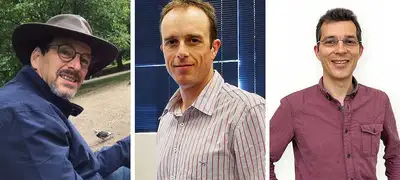
Professors Pauleen, Rowlands and Zellmer.
Professor David Pauleen - School of Management
Professor Pauleen researches emerging work practices, cross-cultural information and knowledge management, virtual team leadership dynamics and technology-mediated communication. More recently, his research has focused on the role of wisdom in management, which will culminate in the publication of a co-authored book, Wisdom, Analytics and Wicked Problems: Integral Decision-Making in and Beyond the Information Age, next year. Based on a cross-disciplinary conceptualisation of "wisdom", the book will demystify the differences between data, information, knowledge and wisdom-based decision making, providing a practical framework for incorporating wisdom into business and management practices. Professor Pauleen’s work has been published in numerous journals, including Industrial Marketing Management, Journal of Business Ethics and Sloan Management Review. He has a high PhD supervision load and is currently supervising five doctoral candidates.
Professor David Rowlands - School of Sport, Exercise and Nutrition
Professor Rowlands conducts leading research in human health and performance nutrition. Earlier this year, he was honoured as the winner of the 2017 Gatorade Sport Science Institute American College of Sports Medicine Sport Nutrition Award at the 64th American College of Sport Medicine annual meeting in Denver, United States. His abstract regarded the impact of ingesting multiple carbohydrates (in liquid and/or solid form) during long-distance triathlon performance.
Professor Georg Zellmer - Institute of Agriculture and Environment
Professor Zellmer’s interests include volcanology, igneous petrology, and high-temperature geochemistry. His work focuses on timescales of petrogenesis, volatile cycling through subduction zones, and linking geophysical and geochemical observations at global destructive plate margins. A member of the Volcanic Risk Solutions Group, this month he led a successful Marsden proposal, Water in spinel: a robust hygrometer for the Earth and Planetary Sciences, receiving fuding of $832,000. Currently, Professor Zellmer is also leading a Ministry of Business, Innovation and Employment strategic partnership project on mitigating volcanic hazards through advanced technologies.
Associate professors
College of Creative Arts
- Simon Morris
- Anna Brown
College of Health
- Aj Ali
- Pamela von Hurst
- Darryl Cochrane
College of Humanities and Social Sciences
- Ingrid Horrocks
- Alison Sewell
- Gina Salapata
- Leonel Alvarado
College of Sciences
- Weihong Ji
- Ngaio Beausoleil
- Jane Alison
- Paul Dijkwel
- Gert Lube
- Jackie Benschop
- Jane Alison
Massey Business School
- David Tappin
- Craig Fowler